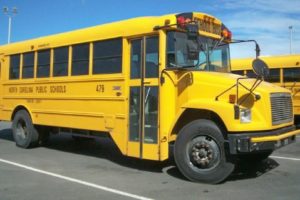School Bus Safety and Laws
With traditional public schools starting in many districts next week including Johnston County Public Schools, it’s important for parents to help their children stay safe at bus stops and for drivers to know the rules of the road. Since 2016, two children have been killed at bus stops in North Carolina.
Parents can help by teaching their children to follow some important safety rules when getting on and off the bus this year.
• When on the way to the bus stop, always walk on the sidewalk. if there isn’t one, stay out of the street;
• While at the bus stop, wait quietly in a safe place away from the road and don’t run or play;
• Always cross the street in front of the bus, never go behind it. if you drop something, tell the driver before you move to pick it up; and
• Respect the danger zone by staying ten steps away from the bus and where the driver can see you.
It’s also good to remind students to talk quietly while on the bus so the driver won’t become distracted and keep the bus aisles clear.
School Bus Passing Laws
 Students aren’t the only ones who need to understand the importance of school bus safety. On average, there are nearly 3,000 incidents of cars passing stopped school buses every school day in North Carolina. Not only is this incredibly dangerous for students, but it’s also against the law.
Students aren’t the only ones who need to understand the importance of school bus safety. On average, there are nearly 3,000 incidents of cars passing stopped school buses every school day in North Carolina. Not only is this incredibly dangerous for students, but it’s also against the law.
Drivers need to remember that…
• On a two-lane road, all traffic from both directions must stop;
• On a two-lane road with a center turning lane, all traffic must come to a stop;
• When on a four-lane road without a median, traffic from both directions has to stop;
• In the case of a divided highway with four or more lanes, only traffic following the school bus needs to stop; and
• When on a road with four lanes or more with a center turning lane, just traffic following the bus must stop.
Penalties for passing a stopped school bus include a $500 fine and an additional four insurance points which will increase insurance rates by 80 percent. It’s imperative that drivers also slow down and obey the posted speed limit in a school zone – a child’s life could depend on it.
Discover more from JoCo Report
Subscribe to get the latest posts sent to your email.











